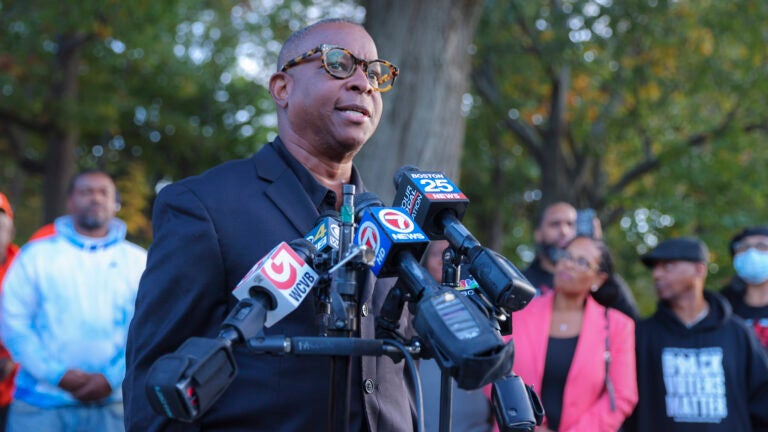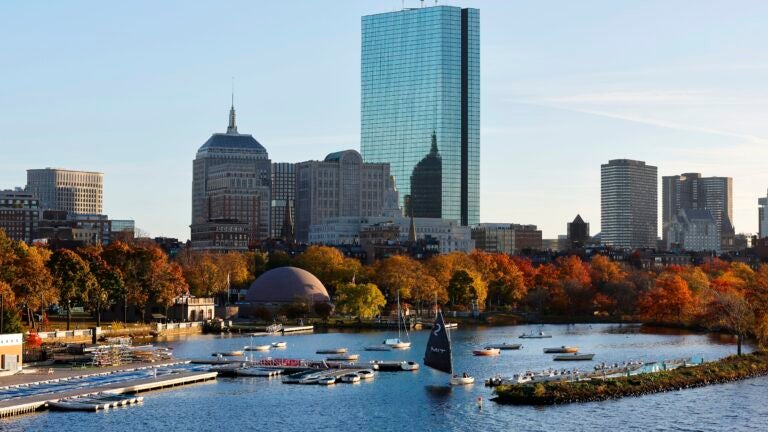Newsletter Signup
Stay up to date on all the latest news from Boston.com

Their stories vary, from a 24-year-old mother who was filming a music video in Dorchester, to a 14-year-old boy who was out in broad daylight, near a playground in Roxbury.
But all seven people have something in common: They were all shot and killed in Boston this month.
After three died in shootings last weekend alone, the Rev. Kevin Peterson of The New Democracy Coalition spent time visiting and speaking with victims’ families and friends.
“My heart sort of went out, because it felt as if the heart of the Black community was being ripped out once again,” he told Boston.com.
According to Peterson, the community has been episodically traumatized by violence, leaving many wondering whether city leaders are doing enough to address systemic violence.
“Black folks across the city are perplexed as much as they are stunned by the loss of life,” he said. “As they see blood shed on their streets, they are left confused and dazed as to where the answers might come from.”
Violence has impacted some of the city’s communities much more than others; out of more than 1,700 fatal and non-fatal shootings logged citywide since 2015, more than 1,300 of the victims were Black or African American, according to Boston Police Department data.
Nearly three-quarters of the shootings happened in Dorchester, Roxbury, or Mattapan.
As of Oct. 23, Boston has so far seen more deadly gun violence this year than it did during the same period in 2021 — 26 fatal shooting victims, compared to 22 last year, according to Boston police data.
The city’s five-year average for fatal shooting victims, not including 2022, is 30.6 per year.
However, there have been fewer non-fatal shootings, with 126 shootings through Oct. 23, compared to 147 during the same period last year.
Boston has seen overall decreases in violent crime and homicides year over year, Mayor Michelle Wu said during a “Radio Boston” appearance Monday.
“Our numbers are down, but we’re seeing incidents of young people and women being involved on the rise,” she said. “So we are leaning in with every possible tool that we have, and we really need every community member to come to the table and help us develop the ways to get to root causes.”
City officials, faith leaders, and community organizers met privately on Tuesday to strategize.
The group discussed expanding access to mental health services and investing in violence prevention and intervention, Wu said in a press conference that followed. That work will include focusing on existing programs and “reinvigorating” a task force of city agencies that she said had “fallen off” over the course of the pandemic.
The press conference also touched in part on Boston Public Schools’ role in prevention and intervention, with Superintendent Mary Skipper discussing the district’s work on mental health and restorative justice programs, as well as chronic absenteeism.
Suffolk County District Attorney Kevin Hayden noted that Boston has been recognized for its various crime prevention and intervention efforts, but said he wasn’t sure whether the city had ever brought those programs together for a comprehensive approach.
By doing so, he said, “I think that we will be able to make the difference.”
The city’s police force is only one component of that response, according to police Commissioner Michael Cox.
The Boston Police Department is “always going to … proactively do all that we can to prevent things through visibility,” he said. “But the fact is that we need support and help, because these issues are far bigger than traditional law enforcement.”
Ensuring community resources for all ages is a crucial step, explained Michael Kozu, co-director of the anti-violence group Project R.I.G.H.T (Rebuild and Improve Grove Hall Together).
Kozu told Boston.com he thinks recent incidents of violence involving children and teens reflect a decrease in opportunities for the city’s youth, citing the pandemic’s part in scaling back community programming and driving isolation.
“When we don’t help guide them [young people], then they will go off and create their own direction,” he said. “And in this case, a lot of it has not been positive.”
When Project R.I.G.H.T. first started in 1991, Grove Hall — a neighborhood that straddles Roxbury and Dorchester — “would often be overlooked in terms of providing equitable resources, and we were always hard-hit by violence due to the lack of opportunities,” Kozu said.
An incoming Grove Hall community center, which the city announced earlier this month, will help fill some of the gaps.
“This is a direct strategy for peace and safety in our neighborhoods, along with youth development and fun and activity,” Wu said on “Radio Boston.”
Wu said Tuesday’s meeting was “not the beginning and end of the conversation,” but a starting point for stakeholders to take ownership of the issue, get the word out, and invite the community into further conversations.
Peterson called on city leaders to follow through.
“There is a tendency sometimes for our elected officials and community leaders to respond with a knee-jerk reaction to high-profile crimes,” he said. “My concern is that what transpired at the meeting between faith leaders and the mayor is a knee-jerk reaction that may not pan out to what the community’s expectations are.”
He called for the creation of a public-private non-violence task force independent of the city’s authority, bringing together city agencies, nonprofits, businesses, and youth organizations for long-term strategizing. The goal, Peterson said, would be to create a comprehensive five-year plan to reduce violence in Black communities.
“That’s the initial part of the strategy,” he said. “We must work together, and not in silos.”
Another first step might entail Boston police directing more resources to neighborhoods disproportionately wracked by violence, Peterson said.
“It is important for the whole city to know that the loss of life of a Black woman in Mattapan is just as important as the loss of life of a white woman in Downtown Boston,” he said. “We are a whole city, which must be responsive to each of the neighborhoods with equal concern.”
Stay up to date on all the latest news from Boston.com

Stay up to date with everything Boston. Receive the latest news and breaking updates, straight from our newsroom to your inbox.
Conversation
This discussion has ended. Please join elsewhere on Boston.com